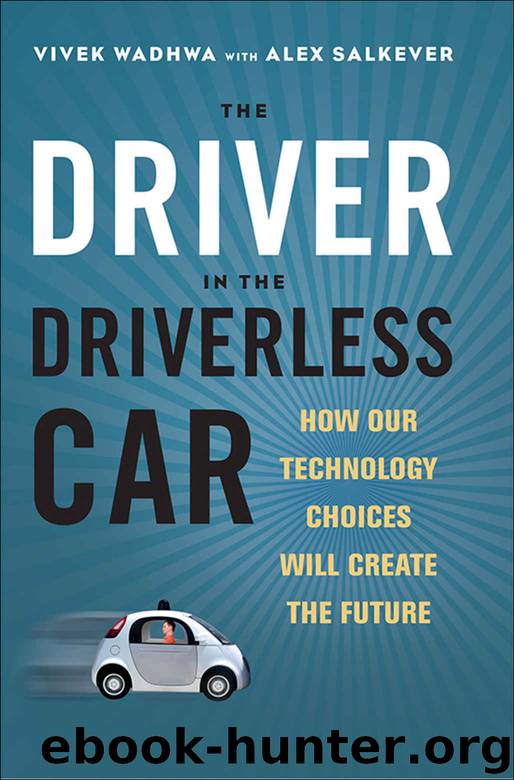The Driver in the Driverless Car: How Our Technology Choices Will Create the Future by Vivek Wadhwa & Alex Salkever

Author:Vivek Wadhwa & Alex Salkever [Wadhwa, Vivek]
Language: eng
Format: azw3
Publisher: Berrett-Koehler Publishers
Published: 2017-04-03T04:00:00+00:00
Do the Benefits Outweigh the Risks?
Increasingly ubiquitous digital-information capture clearly represents a tremendous risk to each and every one of us. These practices are difficult to track: it’s increasingly hard to follow who knows what about us, and where they learned it. The convenience of our digital existences, from online photos to social networks to online document storage, is undeniable and likely irreversible. So do the benefits outweigh the risks?
I have very mixed feelings about whether the risks we face are worth the benefits we receive from putting so much of our data on line so unprotected. Because the system governing use of data on line is not a system at all but an ad hoc jumble of commercial relationships with thin legal protections and even thinner real-world protections, for me the conveniences of one-click online orders and automated log-ins to websites courtesy of Facebook are thin gruel compared with the larger risks we face. The big problem is that users (meaning you and I) have only two alternatives: opt in, or opt out.
That is a choice we should not have to make. Newer practices of managing sensitive data can put users in charge or, alternatively, collect only the data necessary to perform the task at hand. We need a radical shift in how we think about data collection, centering system design on users’ data management and their privacy rights rather than layering them on as an afterthought. Users will vote with their online presence. Noted futurist and author Kevin Kelly observes in his book The Inevitable that “vanity trumps privacy”—that we are willing to give incredibly revealing details about ourselves in exchange for social validation: “They’ll take transparent personalized sharing. . . . If today’s social media has taught us anything about ourselves as a species, it is that the human impulse to share overwhelms the human impulse for privacy.”6
This has been true, in part, because the costs of losing control of our data are hidden and hard to understand. But as identity theft reaches epic proportions and very little of our personal information is left untouched by credit bureaus and malicious online thieves alike, I predict that issues of data security will become far more acute to far more people, making security and privacy unavoidable issues. Then privacy will trump vanity.
In a nutshell, in the present state of affairs, I am not at all convinced that sacrificing our security and privacy for online convenience is worth the price. More accurately, I resent that we are even forced to make such a choice, given the badly structured and poorly policed governing systems for online security and privacy that we presently endure. So far, it’s not worth sharing all your data on line and trusting that nothing bad will happen. If you must share them, I’d recommend mitigating your risk by managing and understanding how data are being used. Yes, it’s an almost impossible task right now. And it’s not going to become more straightforward until we push for it, which is why learning about these technologies and their effects is so important.
Download
This site does not store any files on its server. We only index and link to content provided by other sites. Please contact the content providers to delete copyright contents if any and email us, we'll remove relevant links or contents immediately.
Learning SQL by Alan Beaulieu(6281)
Weapons of Math Destruction by Cathy O'Neil(6265)
Digital Minimalism by Cal Newport;(5750)
iGen by Jean M. Twenge(5409)
Sapiens by Yuval Noah Harari(5366)
The Age of Surveillance Capitalism by Shoshana Zuboff(4277)
Elon Musk by Ashlee Vance(4121)
Thing Explainer by Randall Munroe(3930)
Apollo 8 by Jeffrey Kluger(3702)
Future Crimes by Marc Goodman(3592)
The Science Book (Big Ideas Simply Explained) by DK(3277)
The Innovators: How a Group of Hackers, Geniuses, and Geeks Created the Digital Revolution by Walter Isaacson(3158)
Who Can You Trust? by Rachel Botsman(3129)
I Live in the Future & Here's How It Works by Nick Bilton(2993)
Infinite Energy Technologies by Finley Eversole(2974)
Steve Jobs by Walter Isaacson(2889)
Dawn of the New Everything by Jaron Lanier(2770)
Chernobyl by Serhii Plokhy(2535)
Ben Franklin's Almanac by Candace Fleming(2523)
